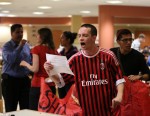Students rallied inside the Hill’s dining halls on Wednesday evening to show their support for unionized University of California service workers who are currently voting on whether or not to strike in response to stalled contract negotiations.
Dressed in red, about 10 students from the Student Collective Against Labor Exploitation at UCLA, commonly known as SCALE, entered De Neve dining hall, Covel dining hall, Bruin Plate and Feast at Rieber without swiping, chanting support for the UC workers to students who were dining.
“We’re here this Valentine’s week to show some love for our UC workers,” one student shouted during the protest.
The protest was organized to pledge support for higher wages and health care benefits for UC workers, said Sarah Dahnke, a second-year global studies student and a member of SCALE.
“As students of UCLA, we want to show the workers that we have their back and support their rights to be able to feed their families,” Dahnke said.
The American Federation of State, County and Municipal Employees 3299 union, or AFSCME, represents service workers across the UC. The union is in ongoing labor negotiations with the UC regarding wages and staffing levels, among other issues.
Last month, the UC offered AFSCME workers a 3 percent wage increase for this year and an additional 3.5 percent wage increases for the following three years, as well as an unprecedented freeze on health care rates.
AFSCME officials, however, said these wage increases were insufficient.
From Tuesday to Thursday this week, the 8,300 UC service workers and about 13,000 patient care workers represented by AFSCME 3299 have the opportunity to vote on whether to organize a strike in protest. A strike would be the third they’ve held in less than a year.
“Strikes are detrimental to our patients and students, and it’s unfortunate that AFSCME is choosing to take another strike vote even as we continue to negotiate with them,” said Shelly Meron, UC spokeswoman, in an email statement.
The last workers’ strike in November cost the university about $30 million, Meron said.
Meron said the UC’s offer to AFSCME workers is fair, referencing that wages at the UC are currently above market rates.
“We have shown significant flexibility on issues AFSCME has said are important to them, but union leaders have repeatedly rejected our offers and refused to show the same flexibility,” she said.
To show their support for the workers, students who participated in the event passed out flyers about the workers’ contract negotiations and gave appreciation cards to the dining hall workers in the spirit of Valentine’s Day.
Dahnke said the workers’ struggle for higher wages mirrors students’ struggle against rising tuition and referenced UC workers’ support for Proposition 30 in 2012.
“We understand that their struggle connects to our struggle, and we want to tell them they are not in this alone,” Dahnke said.
A student collective called the UC Worker Rights Coalition, which SCALE is a part of, coordinated Wednesday’s protest with similar events across other UC campuses this week, Dahnke said.
The students’ plan was to go through as many dining halls as possible before being stopped by campus security, Dahnke said.
“The whole point of the protest was to shock students, because most people are not aware about what is happening to our workers,” Dahnke said after the protest.
The protest caught dining hall officials off guard and caused disturbance for some.
Alfonso Costa, a manager at De Neve dining hall, said it was unaccceptable for students to enter the dining halls without permission and cause disturbance to customers.
Aaron Covington, a custodian at Covel Commons, said he understood the students meant well. Covington has been working at UCLA for five years and is part of the ASCFME union.
On Tuesday, he voted in support of a strike, as he said the wage increase offered by the UC was not enough. Covington had previously participated in a five-day strike in 2008, which he believed had supported the union’s push for wage increase at that time.
A strike, however, is not something many workers want, although it may be necessary to support their demands, Covington said.
